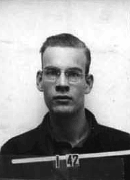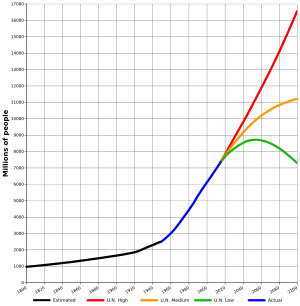Albert Allen Bartlett facts for kids
Quick facts for kids
Albert Allen Bartlett
|
|
|---|---|

Bartlett with Los Alamos wartime security badge (c. 1944)
|
|
| Born |
Albert Allen Bartlett
21 March 1923 Shanghai, China
|
| Died | 7 September 2013 (aged 90) Boulder, Colorado, U.S.
|
| Nationality | American |
| Alma mater | Colgate University (BA) Harvard University (MA, PhD) |
| Known for | Population growth Sustainability |
| Spouse(s) | Eleanor Bartlett |
| Awards | AAPT Distinguished Service Citation (1970) Thomas Jefferson Award (1972) Robert L. Stearns Award (1974) Robert A. Millikan Award (1981) AAPT Melba Newell Phillips Award (1990) M. King Hubbert Award for Excellence in Energy Education (2005) Lifetime Achievement Pacesetter Award (2006) Global Media Award for Excellence in Population Reporting (2008) |
| Scientific career | |
| Fields | Physics |
| Institutions | Los Alamos National Laboratory University of Colorado Boulder |
Albert Allen Bartlett (born March 21, 1923 – died September 7, 2013) was an American physics professor. He taught at the University of Colorado at Boulder. Starting in 1969, Professor Bartlett gave over 1,742 talks. These talks were all about "Arithmetic, Population, and Energy."
Bartlett believed that "sustainable growth" was a confusing idea. He argued that even small yearly increases in population could lead to huge growth over time. Because of this, he thought that human overpopulation was "The Greatest Challenge" facing humanity.
Contents
Professor Bartlett's Journey in Physics
Albert Bartlett earned his first degree in physics from Colgate University in 1944. He then went on to get his master's degree (1948) and Ph.D. (1951) in physics from Harvard University. In September 1950, Bartlett joined the teaching staff at the University of Colorado at Boulder.
Leading in Physics Education
In 1978, he became the national president of the American Association of Physics Teachers. He was also a respected member of the American Physical Society. This group is for top physicists. He was also part of the American Association for the Advancement of Science. From 1969 to 1970, he led the faculty council for the university's four campuses. He also won the Robert A. Millikan award for his work in physics education.
Understanding Population Growth
Professor Bartlett believed that true "sustainable growth" was not possible. He thought that even small percentage increases would lead to very large numbers quickly.
The Power of Exponential Growth
Bartlett explained that growth can add up very fast over time. For example, if you invest money and earn 7% interest each year, your money will double in about 10 years. He applied this same idea, called exponential growth, to the number of people on Earth. He warned that this kind of growth could lead to serious problems.
He gave an example: if a group of 10,000 people grew by 7% each year, it would reach 10 million people in just 100 years.
Humanity's Biggest Challenge
Bartlett saw the failure to understand exponential growth as "The Greatest Challenge" for humanity. He strongly supported sustainable living. This means living in a way that uses resources wisely so there's enough for the future. He was one of the first to speak out about too many people on Earth.
He disagreed with people who thought that resources would always be enough, no matter how much the population grew. He called this idea "The New Flat Earth Society."
Bartlett often shared important thoughts about living sustainably:
"The greatest shortcoming of the human race is our inability to understand the exponential function."
He also asked a powerful question about his "Great Challenge":
"Can you think of any problem in any area of human endeavor on any scale, from microscopic to global, whose long-term solution is in any demonstrable way aided, assisted, or advanced by further increases in population, locally, nationally, or globally?"
His Passing
Albert Bartlett passed away on September 7, 2013. He was 90 years old.
Books
- The Essential Exponential For the Future of Our Planet is a collection of essays by Professor Bartlett (2004). It was published by the Center for Science, Mathematics and Computer Education, University of Nebraska-Lincoln. ISBN: 0-9758973-0-6
His Lasting Impact
In August 2013, just before Bartlett died, the Environmental Center at the University of Colorado at Boulder started training people to give his famous presentation. A team came together because they believed strongly in Dr. Bartlett's message. They wanted to make sure his important ideas would keep being shared in the future.
See also
- M. King Hubbert, author of the Hubbert Curve.
- Thomas Robert Malthus – the originator of the Malthusian catastrophe argument
- Peak oil
 | Percy Lavon Julian |
 | Katherine Johnson |
 | George Washington Carver |
 | Annie Easley |




